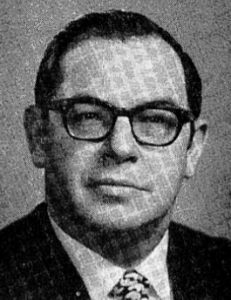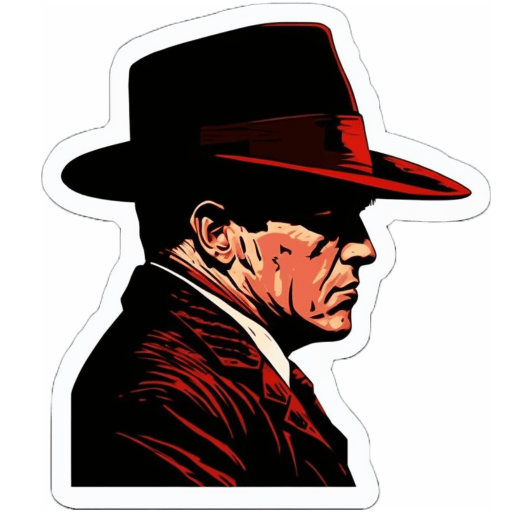Robert Willis Warren was born in Raton, New Mexico on August 30, 1925, son of George R. And Clara (Joliffe)Warren.
He was in the United States Army, 95th Infantry, from 1943 to 1946. He served in Europe during World War II and was wounded in France, receiving a Purple Heart.
married, August 23, 1947, to Laverne D. Voagen.
Warren received a Bachelor of Arts degree from Macalester College in 1950, an MA from the University of Minnesota in 1951, and a Juris Doctor from the University of Wisconsin Law School in 1956. He became a foreign affairs officer in the US Department of State from 1951 to 1953.
Warren practiced law in Elkhorn from 1956 to 1957, and then moved to Green Bay, where he practiced law from 1957 to 1959. He was an assistant district attorney of Brown County from 1959 to 1961, and became district attorney from 1961 to 1965. Warren was a member of the State Senate (Republican of Green Bay) from 1965 to 1969.
of Green Bay) from 1965 to 1969.
May 1968, Warren decided to run for state attorney general after the incumbent (Bronson LaFollette) announced he would run for governor.
June 1968, attorney general Bronson LaFollette demoted LeRoy Dalton from the head of the state’s criminal investigation division. He had brought charges against banker Howard Meister for his connection to a Milwaukee tavern, and when Meister was acquitted he sued Dalton for libel. Republican politicians criticized LaFollette (a Democrat) for this demotion, including Robert Warren of Green Bay and Assembly Speaker Harold Froehlich of Appleton. Dalton was described as “honest” and they felt it unfair. (I’ll cover the Dalton/Meister debacle more elsewhere.)
While running for attorney general in October 1968, he said, “I’m convinced there is some organized crime activity in the state, particularly in the south and southeast.”
LaFollette, while running for governor in October 1968, appeared to agree with Warren to some extent. He said, “One of the most serious crime problems in Wisconsin is commercial gambling. Nationwide it is a billion dollar industry. In the state of Wisconsin many millions of dollars are spent on illegal gambling. A large share of this money finds its way into the coffers of the organized crime syndicate.” He said the problem was that the state gambling laws did not have a clear distinction between commercial gambling and the friendly poker game among friends. This ambiguity allowed law enforcement to be too tolerant of the gambling that wasn’t strictly friendly.
November 5, 1968: election day. Republicans win every major statewide office in Wisconsin: governor, lieutenant governor, secretary of state, treasurer, attorney general. Warren beats his Democratic rival, a member of the Cudahy meatpacking family. Nationwide, Republicans dominated, with Richard Nixon taking the presidency and seats gained in both the House and Senate. It had been a rough year, with the assassinations of RFK, MLK, and the people turning against the Vietnam War.
From 1969 until his resignation in 1974, he was attorney general of Wisconsin.
March 2, 1969: Attorney General Robert Warren spoke publicly about his desire to get legislation that would weaken the Mafia’s grip on the state. He was convinced the Mafia was in Wisconsin, but “intelligence reports are one thing and provable evidence another.” Warren had about 20 bills he hoped would go through, though he recognized some were controversial. One, for example, would require the state justice department to sign off on any tavern licenses, something local governments would probably fight. Another bill would require someone to forfeit their car or aircraft if it was used in narcotics trafficking. An anti-racketeering bill that would have a sentence of 20 years for anyone interfering with commerce through use of threats or violence. He wanted higher penalties for bribing a witness, tougher penalties for commercial gambling, more ballistics testing on seized guns… and more. Robert Jendusa, president of Milwaukee’s common council, said, “Anything he can do legally to make it more difficult for organized crime to operate should be supported. If you can take the profit from such criminal activities… and eliminate any attitude that this is an easy state for such activities, then we certainly want to erase that illusion.”
On April 29, 1969, Attorney General Robert Warren and assistant Daniel P. Hanley sent a confidential letter to Racine’s police chief Leroy Jenkins. Although most of what I have is redacted, Warren wanted any information Jenkins had on a long list of people. Included on that list were district attorney Joseph Molinaro, state rep George Molinaro, Alfred DeSimone, an unnamed son of Pasquale Cosentino, an unnamed son of Eugenio Lamacchia, and Joe Rizzo. Warren warned Jenkins that the investigation was “highly confidential” and he could not say too much “without revealing our purpose.” Many on the list had a connection to either the American State Bank, beer
distribution, or both. And almost all were clearly Italian. (Either Warren or Jenkins passed a copy of the letter to the FBI; it was probably Jenkins.)
May 1969, Warren spoke in favor of laws allowing police to use wiretaps. “Wisconsin has been resident and operating organized crime groups,” he said. “I have no illusions that the enactment of these proposals will resolve all our crime problems. However, adequate laws are one of the tools that law enforcement needs to maintain the balance of a democratic society. I ask that the legislature join with me to begin the job of helping rid this state of this cancer which threatens our society.”
July 1969, the Wisconsin State Journal wrote an editorial in favor of Warren’s bills, claiming “Organized crime syndicates are draining millions of dollars from Wisconsin each year.” They said the money comes from gambling, loan sharking and vending machines.
September 1969, Warren spoke to a group near Waukesha. “Do we have organized crime in Wisconsin? Yes we do. It is not active in narcotics, but works in Wisconsin in loan sharking, gambling, and has infiltrated into some types of businesses. We have a bill under study now which would help our department with this problem… Nothing learned from wiretapping is admissible in court as evidence, which is just the way organized crime likes it, since this is one way for them to legally keep control over each other.”
November 1969, the state legislature expanded the attorney general’s powers to investigate inter-county racketeering. Warren said, “Organized crime’s greatest protections and safeguards are anonymity and the support of its thousands upon thousands of victims who are either unaware or indifferent to the support they provide. Organized crime is bound by no moral or ethical standards, and operates in any manner that suits its purposes whether it be legal or illegal, humane or inhumane. It is a society that seeks to operate outside the control of the American people and their governments.”
Warren was nominated by President Richard Nixon on August 8, 1974, to a seat on the US District Court for the Eastern District of Wisconsin vacated by Judge Robert Tehan. He was confirmed by the Senate on August 22, 1974, and received his commission on August 27, 1974. He served as chief judge from 1986 to 1991. He was appointed a judge of the US Foreign Intelligence Surveillance Court of Review by Chief Justice William Rehnquist in 1989, serving until 1996. He assumed senior status on August 1, 1991. His service terminated on August 20, 1998, due to his death in Milwaukee.
